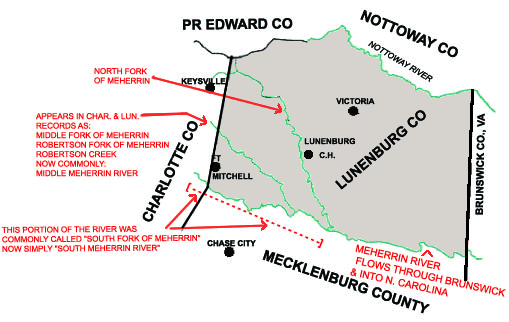- About Lunenberg
- African Americans
- Burials
- Census
- Churches
- Communities
- Miscellaneous
- Families
- History
- Houses & Landmarks
- Land
- Maps
- Marriages
- Resources
- Schools
- Taxes
- Wills
The Forks of the Meherrin River
The Dividing line between Charlotte County and Lunenburg
This drawing is to show how the heads of the forks of Meherrin are barely in Charlotte County. The North and Middle Forks flow southeastwardly through Lunenburg. The South Fork forms the division between Lunenburg and Mecklenburg before the forks join to form the Meherrin which divides the rest of Lunenburg from Mecklenburg.
The various labels given the Middle Fork (or Middle Meherrin) in deeds sometimes create confusion. It was frequently referred to as "Robertson Fork of Meherrin" and sometimes, Robertson Creek.

© JoLee Gregory Spears 2002
The above map section shows the Lunenburg/Charlotte Co., VA line as it was in 1770.
This was five (5) years after Charlotte County was formed from Cornwall Parish, Lunenburg County, and seven (7) years before the change in 1777 from the point the South Fork of Meherrin joins the Lunenburg/Charlotte dividing line and northward.
From Charlotte County-Rich Indeed, p. 62
In May 1777, the act (in part):
"Whereas part of the parish of Cornwall and county of Charlotte, is very inconvenient for the inhabitants thereof, and would be more convenient to the parish of Cumberland and county of Lunenburg: Be it therefore enacted, that the surveyor of the said county of Lunenburg shall, on or before the first day of October next, run a line, to begin WHERE MECKLENBURG AND LUNENBURG STRIKE CHARLOTTE COUNTY LINE, DIRECTLY TO THE PLACE CALLED WIMBUSH'S ORDINARY; and that all that part of the said parish of Cornwall, and county of Charlotte, which shall lie on the east side of the said line, shall from thenceforth be add to the parish of Cumberland and county of Lunenburg."
It appears that in 1770, the map showing the line dividing Charlotte from Mecklenburg and Lunenburg was continuous and one angle. Present-day, the line dividing Charlotte from Mecklenburg is about 34.5 degrees east of north. The line dividing Charlotte from Lunenburg is about 12 degrees east of north. Theoretically, I assume, one could continue (on a present-day map) the Charlotte/Mecklenburg 34.5 degrees east of north line through Lunenburg and approximate the area of Charlotte that reverted to Lunenburg in 1777.
Following is the full reference to the map and a search method to find it online:
Library of Congress "American Memory Historical Collections for the National Digital Library"
Hint:
Search: type in "A New and Accurate Map of Virginia"
Category "Search All Map Collections"
"Match the exact phrase"
A new and accurate map of Virginia wherein most of the counties are shown from actual surveys. With a concise account of the number of inhabitants, the trade, soil, and produce of that Province.
Henry, John, 1704 or 5-1773. CREATED/PUBLISHED NOTES REFERENCE SUBJECTS |
RELATED NAMES MEDIUM CALL NUMBER
REPOSITORY DIGITAL ID |

